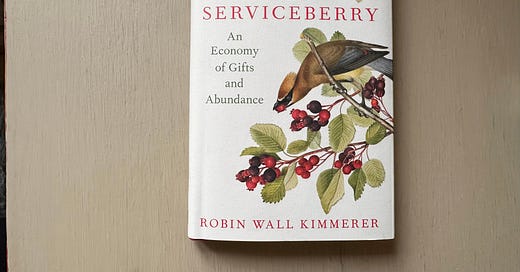“When an economic system actively destroys what we love, isn’t it time for a different system?”
- from The Serviceberry, by Robin Wall Kimmerer
I loved Robin Wall Kimmerer’s book, Braiding Sweetgrass. It is one of my all-time favourites, so I was excited to read her latest offering, which came out this week.
This new book, The Serviceberry, is a slim volume. Just a short 105 pages. It makes a great little introduction for anyone who perhaps may not have given much thought to how the economy works (or doesn’t work). And for those who have, the book is a little clarion call for how we might disturb and disrupt the status quo. It includes themes that were touched on in Braiding Sweetgrass - the gift economy and the Honorable Harvest - and expands on an essay originally published in Emergence Magazine, so it might well be that there are parts that will feel familiar to you if you have read those.
Using her local, native Serviceberry trees (Amelanchier arborea) as a model for how an economic system that aligns with ecological principles could work, and in her characteristic, gentle yet to-the-point manner, she invites us to reconsider our relationships of exchange and to question the way our dominant economic systems have commodotised everything into objects and property to be exploited, hoarded and sold for profit accumulation. Instead, we are offered the idea of a gift economy and a culture of gratitude, abundance and reciprocity as organising principles, rather than the scarcity, greed and self-interest that modern economic theory is predicated on.
Don’t let the subject matter of the economy put you off if that’s not your usual thing. It’s approachable and digestible. Wall Kimmerer, herself a botanist, admits that her knowledge of conventional economics is small. Really it’s about indigenous wisdom, how we want to live, what we value, how we want to be in relation, and whether we can imagine and cultivate a system that nurtures mutual well-being and flourishing.
“In a gift economy, wealth is understood as having enough to share, and the practice for dealing with abundance is to give it away. In fact, status is determined not by how much one accumulates, but by how much one gives away. The currency in a gift economy is relationship, which is expressed as gratitude, as interdependence and the ongoing cycles of reciprocity. A gift economy nurtures the community bonds that enhance mutual well-being; the economic unit is “we” rather than “I,” as all flourishing is mutual.”
- from The Serviceberry, by Robin Wall Kimmerer
I appreciate how she acknowledges that she is “harnessed to this [our dominant] economy, in ways large and small, yoked to pervasive extraction.” And yet here she is still interested, engaged and active in trying to move towards something better, more just. We are all implicated. A politics of purity only serves to keep us stuck.
She acknowledges too that the market economy is not about to disappear and also that this work is for the long haul - likening it to the sustainable, “mature” growth that comes after the initial, fast-growing, colonising plants that dominate when land is initially cleared begin to disappear. Those opportunists are replaced by more persistent inhabitants more reliant on relationships of cooperation, reciprocity and replenishment. It feels hopeful, realistic, achievable - even if the scale of change we would like to see might not happen in our lifetime, we can be doing something now that makes a difference and contributes to the longer term. Change is coming.
“…our patterns of gross overconsumption have brought us to the brink of disaster. What would it be like to consume with the full awareness that we are the recipients of earthly gifts, which we have not earned? To consume with humility? We are called to harvest honorably, with restraint, respect, reverence, and reciprocity.”
- from The Serviceberry, by Robin Wall Kimmerer
In the book, Wall Kimmerer argues for creating gift economies in the gaps, openings and edges - disrupting and subverting the status quo. We have agency, we have tools available to us, we can imagine and practice alternatives, it’s happening around us if we look. And she makes it sound fun, joyful and delicious. Who can resist?
Disclosure: This copy of The Serviceberry was sent to me by the publisher. I am under no obligation to share. This review has been entirely my own choice and opinion.




